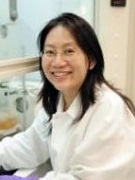 |
Liqun Huang, B.S., M.S.
Senior Research Support Specialist Email: Liqun.huang@stonybrookmedicine.edu |
Ms. Huang received her B.S. and M.S. from Wuhan University, P. R. China, graduating valedictorian of her class. Her most recent work has focused on evaluating the effects of a novel class of compounds on cancer and inflammation and exploring their mechanisms of action. Among her accomplishments are the demonstration of the broad anticancer efficacy of these compounds and the delineation of their novel mechanism of action. Currently, she is pursuing the development of efficacious drug combinations for the control of cancer.
Her prior work includes studies on: the viral tegument protein pp71; viral gene expression and replication; and genome-based identification of cancer genes involved in leukemia.
Selected Publications
- Huang L, Wong CC, Mackenzie GG, Sun Y, Cheng KW, Vrankova K, Alston N, Ouyang N, Rigas B. Phospho-aspirin (MDC-22) inhibits breast cancer in preclinical animal models: an effect mediated by EGFR inhibition, p53 acetylation and oxidative stress. BMC Cancer. 2014;14:141.
- Huang L, Mackenzie GG, Sun Y, Ouyang N, Xie G, Vrankova K, Komninou D, Rigas B. Chemotherapeutic properties of phospho-ninsteroidal anti-inflammatory drugs, a new class of anticancer compounds. Cancer Res. 2011;71(24):7617-27.
- Huang L, Mackenie G, Ouyang N, Sun Y, Xie G, Johnson F, Komnium D, Rigas B. The novel phospho-non-steroidal anti-inflammatory drugs, OXT-328, MDC-22 and MDC-917, inhibit adjuvant-induced arthritis in rats. Br J Pharmacol., 2011;162(7):1521-33
- Huang L, Zhu C, Sun Y, Xie G, Mackenzie GG, Qiao G, Komninou D, Rigas B. Phospho-sulindac (OXT-922) inhibits the growth of human colon cancer cell lines: A redox/polyamine dependent effect. Carcinogenesis, 2010;31(11):1982-90.
- Sun Y, Huang L, Mackenzie GG, Rigas B. Oxidative Stress Mediates through Apoptosis: The Anticancer Effect of Phospho-Nonsteroidal Anti-inflammatory Drugs: Implications for the Role of Oxidative Stress in the Action of Anticancer Agents. J Pharmacol Exp Ther. 2011;338(3):775-83.
For a complete list of publications, Click Here.